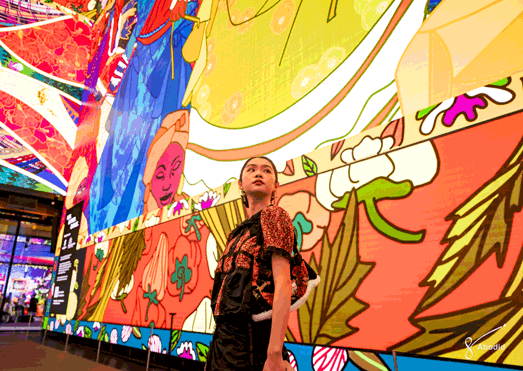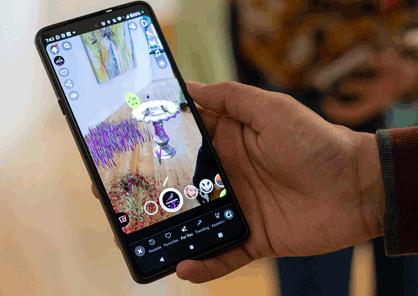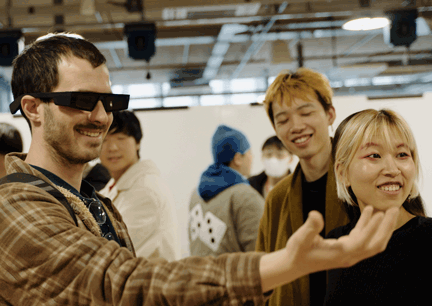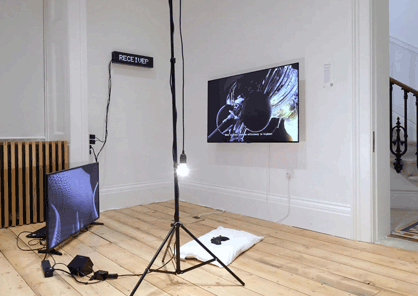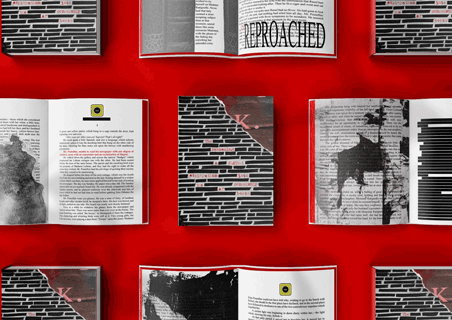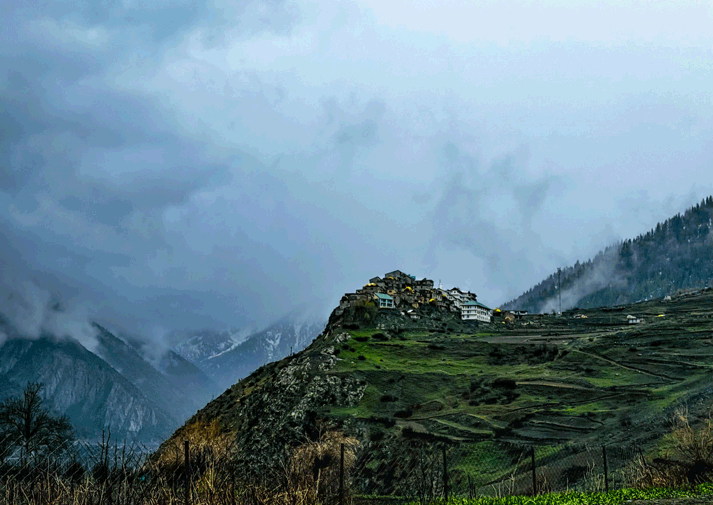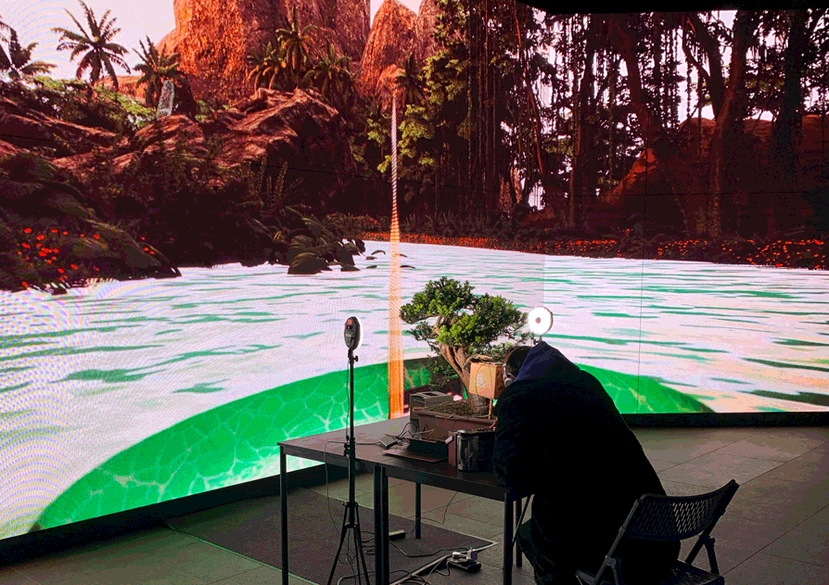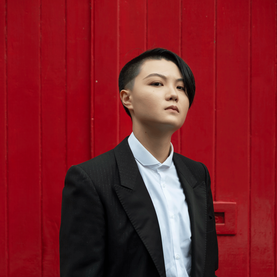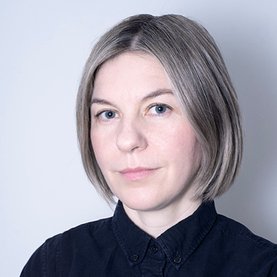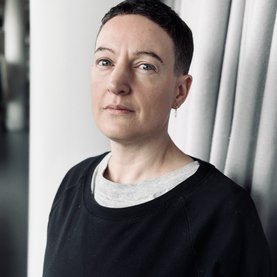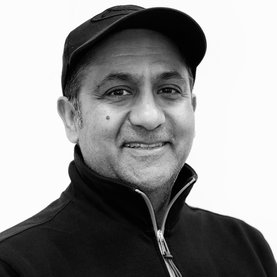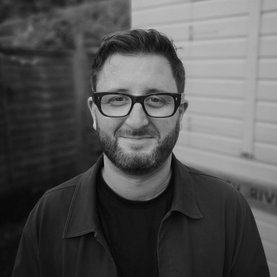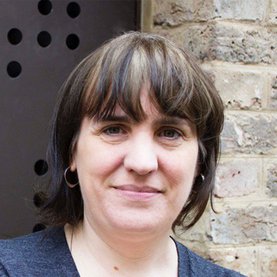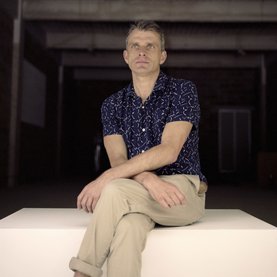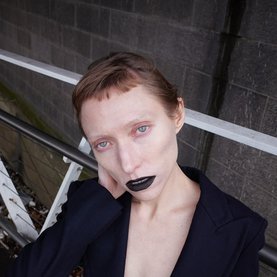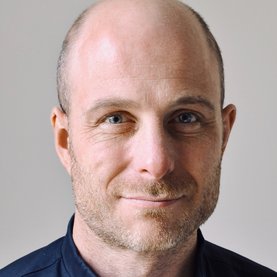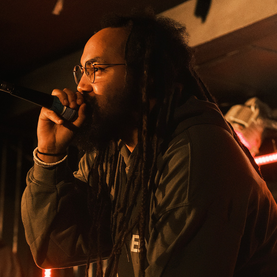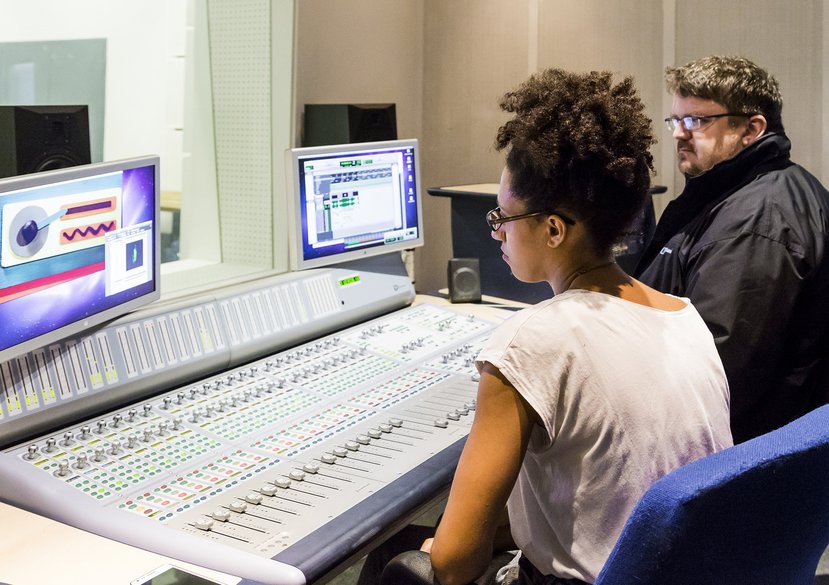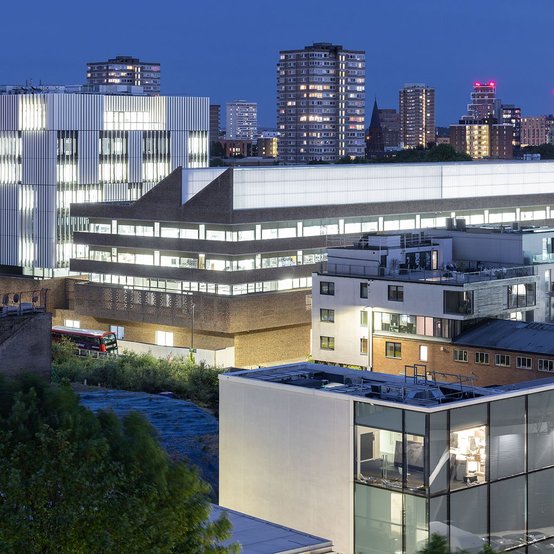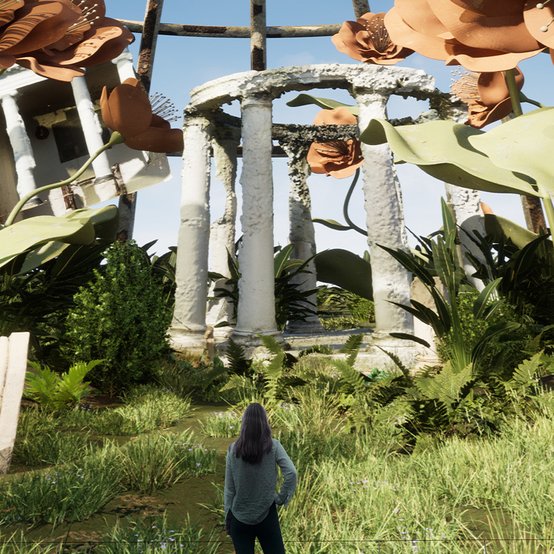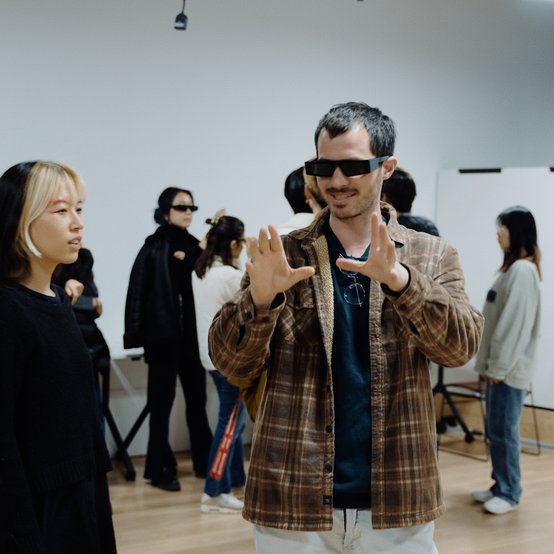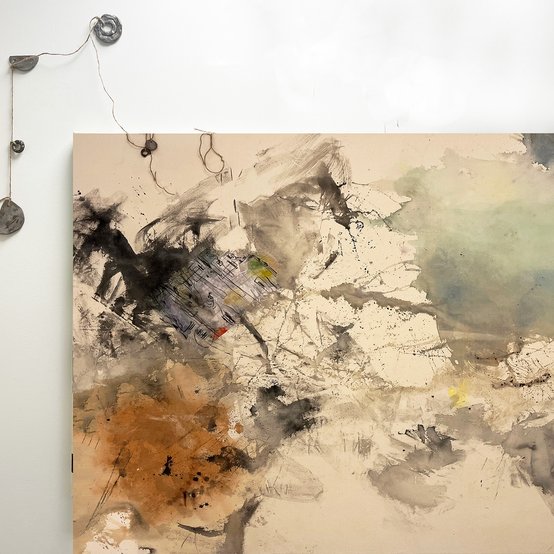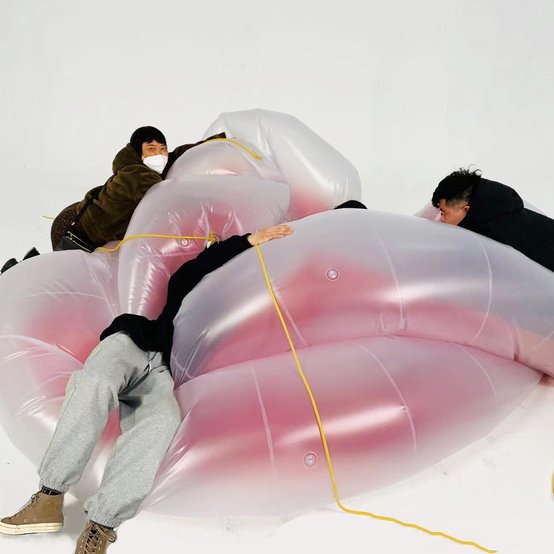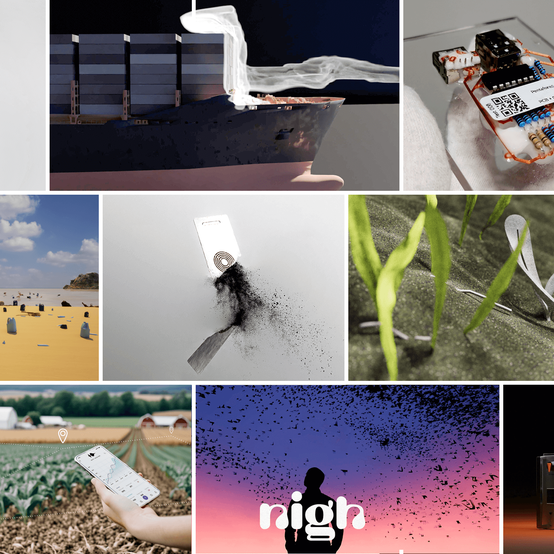
Overview
The future of storytelling
Key details
- 180 credits
- 1 year / 45 week programme
- Full-time study
School or Centre
Current location
- White City
Next open event
- 6 May 2025
- Join next Online Q&A Week
Round 2 application deadline
- 30 Jun 2025
Career opportunities
- Immersive and interactive storytellers
- Digital artists
- XR directors
- Expanded film and documentary makers
- Cross-platform media designers
- UI and UX designers
- Creative technology developers
- Critical writers
- Activists and campaigners
- Digital visualisers
- SFX artists
Experiment with new, digital directions at the intersection of storytelling, film, digital art, video games, performance, installation and sound to tell stories that matter.
- Investigate the future of storytelling as you explore diverse practices and traditions alongside groundbreaking creative technologies like VR, AR and AI.
- Collaborate with others to research and develop compelling immersive and interactive narrative experiences that address urgent concerns in contemporary culture.
- Join a world-leading community of researchers and practitioners establishing exciting new paradigms in immersive and interactive storytelling.
Grounded in, and for, the real world
The world urgently needs people who can craft impactful narrative experiences creatively and responsibly, whether addressing social inequalities, climate citizenship, or exploring equitable ways to tell stories with people, other species and our planet. With us, you’ll learn to view the world critically, cut through hype and misinformation, and collaborate with others to experiment with how immersive and interactive storytelling can create positive and enduring change.
On the RCA Digital Direction MA, you’ll explore how technologies like VR, AR, AI, games engines, spatial sound and mobile platforms impact diverse storytelling practices, traditions, cultures and audiences. And you’ll look to emerging developments as you consider meaningful ways to communicate with others.
You’ll be encouraged to rethink and reframe what storytelling can be, how it can be combined responsibly with emerging technologies, and how it can be used to bring people together, bridge diverse experiences, confront inequalities, and show more just ways for us to live in – and with – our world.
Our programme will equip you to be a creative thinker, maker and leader in your chosen field. You may opt to work in the arts, technology, journalism, film, media, performance, establish a creative studio or contribute to governmental or non-governmental organisations. Or you may decide to pursue further research, developing new insights into the evolving contexts, methodologies and applications of inclusive, immersive and interactive storytelling.
Catch the replays from our latest online Open Day.
Gallery
Staff
Facilities
The School of Communication is currently located on our White City site.
View all facilitiesOur mixed-use studios encourage collaborative working, thought, awareness and action. In addition, you have access to craft and technical workshop areas and excellent technical support in the College.
Our alumni
Our alumni form an international network of creative individuals who have shaped and continue to shape the world. Click on each name to find out more.
Where will the RCA take you?More details on what you'll study.
Find out what you'll cover in this programme.
What you'll cover
Programme structure
Term 1
During Critical Stories (45 credits), we will explore the foundational approaches of the programme, focusing on critical, co-operative and experimental storytelling methods, media ecologies and artefacts. During the unit you will be introduced to diverse concepts and practices relevant to contemporary storytelling, media and communication. Working with others, you will be asked to assemble a project that proposes, tests and evaluates inclusive forms of digital storytelling practice, using responsive methods to explore contexts and/or raise the visibility of urgent concerns in contemporary culture.
Across terms 1 and 2, you will participate in AcrossRCA (30 credits). This unit aims to support you to meet the challenges of a complex, uncertain and changing world by bringing you together to work collaboratively in cross-programme interdisciplinary teams. In your team you will develop a self- initiated themed project, informed by expertise within and beyond the College. These projects will challenge you to collectively use your intellect and imagination to address key cultural, social, environmental and economic challenges. In doing so, you will develop and reflect on the abilities required to translate knowledge into action, and help demonstrate the contribution that the creative arts can make to our understanding and experience of the world.
Term 2
The Making Worlds with Others (15 credits) School-wide unit will allow you to work alongside students within and across the School. Working from the perspective of your individual practices and disciplines, you will develop a project that engages with others and/or creates mutual exchanges of ideas and understandings, with the intention to create critically engaged situations and/or outcomes resulting in convivial knowledge exchange. Through collaborative learning and making the unit will support you in understanding knowledge exchange and public engagement and how you are to situate your own practice in these territories. The unit will also ask you to question how socially engaged practice can contribute to cultural understanding, co-researching and co-creating methods for knowing with, not knowing about.
Immersive Enquiries (30 credits), focuses on working critically and experimentally with immersive environments, mobile platforms, and emerging areas of media practice to conceptualise, test and evaluate future directions. During the unit you will be asked to produce a prototype for an immersive storytelling environment and/or mobile platform that looks critically and collectively at real-world concerns, and to collaborate with others to explore the changing effects of interactive time-based media on human communication, behaviour and experience.
Term 3
In the Independent Research Project (IRP) (60 credits), you will have the opportunity to work independently to develop a comprehensive programme of research-led practice, critically exploring a topic of your own choosing through individual or collaborative approaches. The unit provides scope for you to bring together the core competencies, methods and processes you have developed during the programme and to define, contextualise, produce and evaluate a substantial body of creative and critical research. During the unit you will be asked to engage responsibly with storytelling perspectives and research methods, and to address real-world concerns inclusively within your work. You will also be encouraged to hone your research, professional and leadership skills, articulate your future direction, and show how your practice contributes to debates that are at the forefront of the field.
This MA is delivered over 45 weeks.
AcrossRCA
AcrossRCA is a compulsory 30-credit unit which is delivered as part of all MA programmes.
Situated at the core of your RCA experience, this ambitious interdisciplinary College-wide unit supports you in responding to the challenges of complex, uncertain and changing physical and digital worlds. Developed in response to student feedback, AcrossRCA creates an exciting opportunity for you to collaborate meaningfully across programmes.
Challenging you to use your imagination and intellect to respond to urgent contemporary themes, this ambitious unit will provide you with the opportunity to:
- make connections across disciplines
- think critically about your creative practice
- develop creative networks within and beyond the College
- generate innovative responses to complex problems
- reflect on how to propose ideas for positive change in local and/or global contexts
AcrossRCA launches with a series of presentations and panel discussions from acclaimed speakers who will introduce the themes and act as inspirational starting points for your collaborative team response.
Delivered online and in-person across two terms, the unit has been designed to complement your disciplinary studies and to provide you with a platform to thrive beyond graduation.
Requirements
What you need to know before you apply
Candidates are selected entirely on merit and applications are welcomed from all over the world. The selection process considers creativity, imagination and innovation as demonstrated in your portfolio, as well as your potential to benefit from the programme and to achieve high MA standards overall.
You will normally have completed an undergraduate qualification in a relevant subject or be able to evidence equivalent professional experience in fields such as filmmaking, broadcasting, media and communication, fine art, graphic design, sound, music, illustration, theatre, writing, HCI or digital production.
All candidates are required to submit an online portfolio of work to be assessed by the programme team; see below for more detail.
Candidates are selected on the basis of a body of work that demonstrates an advanced understanding of the subject and sufficient technical skill to realise intentions, evidence of commitment to the subject, intellectual curiosity, open-mindedness, the ability to collaborate, to engage in debate and respond to criticism, and the ability to engage in sustained and consistent study. We also look for enthusiasm for your practice and a strong sense of personal responsibility for your own learning and development.
What's needed from you
Portfolio requirements
Digital Direction addresses our urgent need for inclusive and relevant storytelling, examining the emergence of new technologies and time-based media (which means media that change over time, such as video, sound, immersive environments, mobile platforms, VR, AR, games etc) alongside the future of storytelling itself. The programme is for creative and critical practitioners with diverse backgrounds who want to experiment creatively and collectively with new narrative approaches driven by ethical, environmental, epistemological and social imperatives, and who have a passion for exploring how storytelling can inform positive change.
Please submit one PDF portfolio containing documentation of no more than three projects or pieces of work that evidence your match and potential for meeting the aims of our course. We expect to see evidence of great interest in using technology to push the boundaries of storytelling, as well as the ability to bring a critical perspective to the hype surrounding such technologies.
Please include a separate section within the PDF portfolio for each of your projects or pieces of work. If any of your projects or pieces of work involve collaboration, please clearly describe your individual contribution to the project or piece of work. We advise you to include one page on research, one page on project development, one page on outcome(s), and one page on testing and evaluation, for each of the projects or pieces of work in your PDF portfolio. Please ensure that all text in your PDF portfolio is minimum font size 11. PDF portfolios should be no more than 100MB and format your portfolio for screen (approx 16:9).
Please also upload any media files that relate to your three projects or pieces of work using the spaces provided in the application system. Please label each of your media files clearly so that we can understand how they relate to your PDF portfolio. Suggested naming format: Title of Project or Piece of Work, Name of Media File (for example: Whale Fall, 3D Animated Video).
We welcome career changers. If you do not have a technical or time-based media or storytelling background, please also explain how and why you want to expand your work into these areas.
Personal statement
Please provide a 300-word written personal statement that addresses the following points:
- Introduce yourself, your interests and your motivations for applying to the Royal College of Art, and to this programme in particular.
- Briefly summarise any educational background and professional experience to date that will support your application.
- Tell us what you want to do in the future.
Video requirements
You must submit a video of no more than two minutes as part of the application process.
In this video, please tell us why you want to join the programme:
- What stories do you want to tell?
- What ambitions do you have for your work?
- How can technology specifically enhance the stories you want to tell?
- What critical and conceptual perspectives will you bring to your studies?
- Which theoretical or philosophical ideas and texts have advanced your understanding of storytelling, media and technology today?
- What ideas interest you and why?
English-language requirements
If you are not a national of a majority English-speaking country you will need the equivalent of an IELTS Academic or UKVI score of 6.5 with a 6.0 in the Test of Written English (TWE) and at least 5.5 in other skills. Students achieving a grade of at least 6.0, with a grade of 5.5 in the Test of Written English, may be eligible to take the College’s English for Academic Purposes course to enable them to reach the required standard.
You are exempt from this requirement if you have received a 2.1 degree or above from a university in a majority English-speaking nation within the last five years.
If you need a Student Visa to study at the RCA, you will also need to meet the Home Office’s minimum requirements for entry clearance.
Fees & funding
For this programme
Fees for new students
Fees for September 2025 entry on this programme are outlined below. From 2021 onward, EU students are classified as Overseas for tuition fee purposes.
Home
Overseas and EU
Deposit
New entrants to the College will be required to pay a non-refundable deposit in order to secure their place. This will be offset against the tuition fees.
Home
Overseas and EU
Progression discount
For alumni and students who have completed an RCA Graduate Diploma and progress onto an RCA MA programme, a progression discount of £1,000 is available.
* Total cost is based on the assumption that the programme is completed in the timeframe stated in the programme details. Additional study time may incur additional charges.
Scholarships
Scholarships
The RCA scholarship programme is growing, with hundreds of financial awards planned for the 2025/6 academic year.
For more information and examples of financial awards offered in 2024/25, visit the Scholarships & awards webpage.
You must hold an offer to study on an RCA programme in order to make a scholarship application in Spring 2025. A selection of RCA merit scholarships will also be awarded with programme offers.
We strongly recommend that you apply for your programme as early as possible to stand the best chance of receiving a scholarship. You do not apply directly for individual awards; instead, you will be invited to apply once you have received an offer.
More information
Additional fees
In addition to your programme fees, please be aware that you may incur other additional costs associated with your study during your time at RCA. Additional costs can include purchases and services (without limitation): costs related to the purchase of books, paints, textiles, wood, metal, plastics and/or other materials in connection with your programme, services related to the use of printing and photocopying, lasercutting, 3D printing and CNC. Costs related to attending compulsory field trips, joining student and sport societies, and your Convocation (graduation) ceremony.
If you wish to find out more about what type of additional costs you may incur while studying on your programme, please contact the Head of your Programme to discuss or ask at an online or in person Open Day.
We provide the RCASHOP online, and at our Kensington and Battersea Campuses – this is open to students and staff of the Royal College of Art only to provide paid for materials to support your studies.
We also provide support to our students who require financial assistance whilst studying, including a dedicated Materials Fund.
External funding
There are many funding sources, with some students securing scholarships and others saving money from working. It is impossible to list all the potential funding sources; however, the following information could be useful.
Payments
Tuition fees are due on the first day of the academic year and students are sent an invoice prior to beginning their studies. Payments can be made in advance, on registration or in two instalments.
Start your application
Change your life and be here in 2025. Applications now open.
The Royal College of Art welcomes applicants from all over the world.
Before you begin
Make sure you've read and understood the entrance requirements and key dates.
More information about eligibility and key datesCheck you have all the information you need to apply. Choose the programme you want to apply to and review programme-specific entrance and portfolio requirements on the programme page.
Read our application process guideConsider attending an Open Day, or one of our portfolio or application advice sessions.
See upcoming sessionsPlease note, all applications must be submitted by 12 noon on the given deadline.
Ask a question
Get in touch if you’d like to find out more or have any questions.


